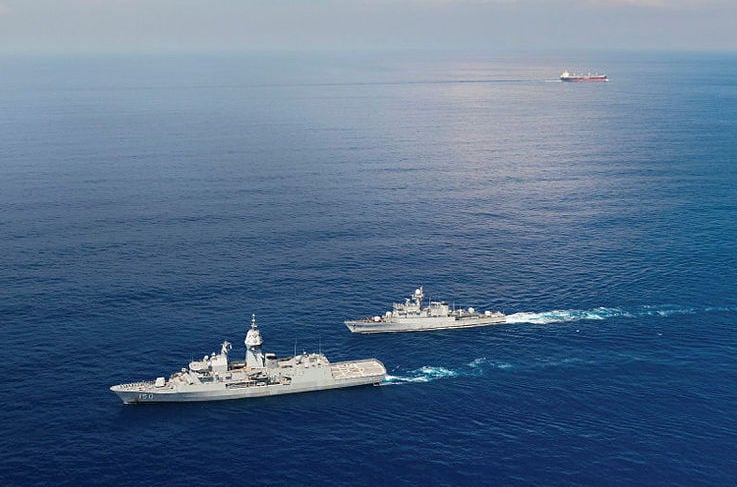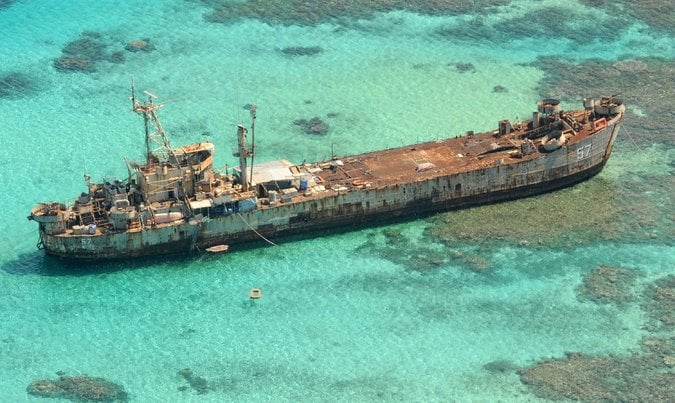
Australia and the Philippines agreed to joint patrols in the South China Sea on Friday as the two countries elevated their ties to a strategic partnership. Australian Prime Minister Anthony Albanese and Philippine President Bongbong Marcos inked several agreements and a joint declaration during their first-ever bilateral meeting in Manila amid tensions with China.
“Today is a watershed moment for relations between Australia and the Philippines. Our Strategic Partnership will facilitate closer cooperation between our countries and contribute to an open, stable and prosperous Indo-Pacific region,” said Albanese.
As Canberra and Manila elevated their cooperation at Malacañang while a resupply mission to BRP Sierra Madre (LST-821), an outpost in the SCS on a World War II–era LST, was underway. Images released by the Philippine Coast Guard show a swarm of People’s Armed Forces Maritime Militia and China Coast Guard vessels impeding the resupply mission. The Armed Forces of the Philippines declared that the resupply attempt was a success and denounced the harassment from Chinese vessels.
China’s latest attempts to harass the Philippine holding at Ayungin Shoal made headlines last month as the Philippine Navy and Coast Guard ran the gauntlet to resupply the beleaguered marines on board Sierra Madre.
Australia further voiced its support for upholding Manila’s sovereignty, and Marcos thanked Albanese for Australia’s “strong support.” “You have made very clear that the claims that are being made upon Philippine maritime territory are not valid and have not been recognized and not in conjunction or consistent with international law,” Marcos said.
In the bilateral declaration, Australia and the Philippines stated that they would “enhance and strengthen our extensive and long-standing defense and security cooperation” with joint exercises and bilateral patrols in the South China Sea.
This makes Australia the second country, after the United States, to commit to joint patrols with the Philippines in the South China Sea. With the Philippines in a David vs. Goliath struggle against Chinese incursions, both Manila and its partners see joint patrols as a useful demonstration of support. Earlier in the month, USS Ralph Johnson (DDG-114) and Philippine Navy flagship BRP Jose Rizal (FF-150) held a joint bilateral sail in the South China Sea that focused on maneuvers between the two ships. A U.S.-Philippines joint patrol is set to occur before the end of the year.

As one of the Philippines’ closest defense partners, Australia is one of only two countries with a Visiting Forces Agreement that allows Australian troops to participate in complex and larger exercises in the Philippines. Last month, the Australian Defence Force and the Armed Forces of the Philippines held Exercise Alon 2023—the first-ever bilateral amphibious exercise between Canberra and Manila—which saw more than 2,000 troops from Australia, the Philippines, and the United States land troops across the archipelago.
Australian ambassador to the Philippines Hae Kyong Yu highlighted how Alon 2023’s activities showed the growth of the two countries’ alliance in a letter released a day before the strategic partnership signing. “Australia and the Philippines will continue to work together to ensure that our region remains peaceful, where national sovereignty is respected and where the rules and norms of international law that have prevailed among us for decades continue to determine how countries should behave towards each other.”
Canberra is one of the many countries enhancing cooperation with Manila as tensions increase as a result of Chinese actions against the Philippines in the South China Sea. The United States, the Philippines’ closest and only treaty ally, has been ramping up engagement with Manila with transfers of patrol boats, larger exercises and access to more military bases. Today, two former U.S. Navy Cyclone-class patrol ships were officially commissioned into the Philippine Navy. Shortly after the commissioning ceremony, a U.S.-funded educational facility was turned over to the Philippine Coast Guard. Japan and India also are providing visible support to the Philippines, with Tokyo providing Manila with its coast guard fleet and New Delhi selling BrahMos anti-ship missiles. Tokyo and New Delhi have also indicated that they are considering joint patrols with the Philippines.





